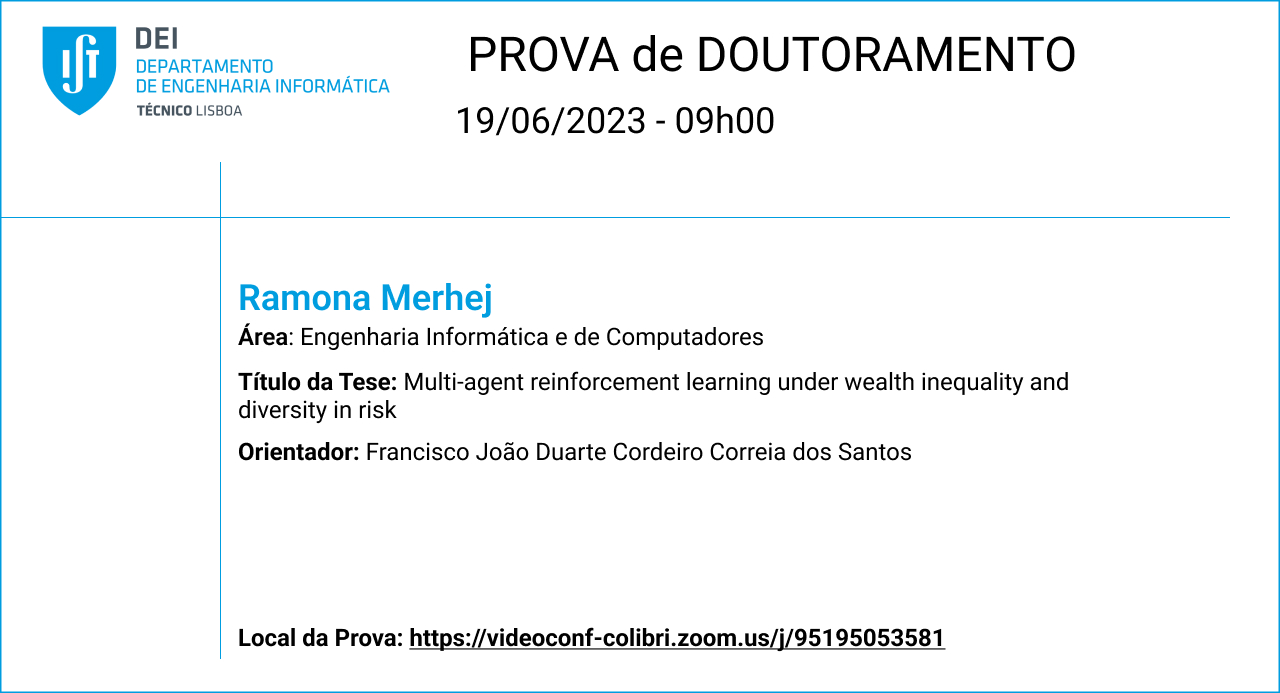Prova de Doutoramento da aluna Ramona Merhej

Área: Engenharia Informática e de Computadores
Título da Tese: Multi-agent reinforcement learning under wealth inequality and diversity in risk
Local da Prova: https://videoconf-colibri.zoom.us/j/95195053581
Data: 19/06/2023
Hora: 09h00
Abstract: Global risks are problems entailing potential and lurking disasters that may materialize if not properly governed. These include the climate change problem, carrying the menace of extreme weather events, or pandemics bearing the possibility of a health crisis. Managing global threats effectively requires a collective action by a population whose individuals are likely arranged in smaller groups of interaction. Achieving collective action necessitates high levels of cooperation and coordination among the participants. Despite the urgency of reaching collective action, humans often have difficulties achieving cooperation and converge to sub-optimal and defective solutions. The collective risk dilemma abstracts this problem into an N-player social dilemma occurring within a larger population. Here, agents may contribute or not to a common pool to reduce their chances of future losses. Using this model, game theory analyzed and clarified the difficulties involved in avoiding collective risks. We advance the literature on collective risk dilemmas by introducing and investigating the impact of wealth inequality and risk diversity on the aforementioned system. We model binary diversities in wealth, risk exposure, and risk assessment, and develop a novel analytical analysis of the game based on class coordination, where agents of a same wealth or risk class play the same policy. We complement this analysis with social simulations using populations of independent reinforcement learners. We draw our conclusions on the global effects of heterogeneity by evaluating 1) the global population target achievement rate, 2) the total population contributions, and 3) the remaining population welfare after engaging in a collective risk dilemma. Additionally, we examine the result of heterogeneity on fairness and equality in the population, by assessing the distribution of the same measures among agents of different wealth and risk classes. Compared to homogeneous populations, our research reveals that both wealth inequality and risk diversity can hinder cooperation, increase disaster occurrences, and augment collective losses. We demonstrate that averaging out and discarding internal heterogeneity between agents can cause significant inaccuracies in the model outcome. Importantly, several contrasting dynamics are observed when comparing cooperation distribution between class-coordinated populations and independent reinforcement learners. Class-coordination always ensures higher target achievement, but can facilitate free-riding of rich agents on poor agents' contributions, especially in large group interactions. On the other hand, in RL populations, cooperation is primarily assured by rich agents. Additionally, we find that wealth inequality further exacerbates long term inequality, causing rich agents to become richer and poor agents to become poorer. Risk exposure diversity can also create wealth inequality in a population with an initial uniform wealth distribution. A bias in group assortment - i.e., high probability that agents from the same risk class play together - can mitigate these unfavorable consequences. The opposite is true for diversity in risk assessment which only generates inequality when combined with a bias in group assortment. Finally, self-interested class-coordination can achieve socially optimal outcomes in the presence of wealth inequality, but is insufficient in the presence of risk diversity. Our work brings a deeper understanding of social dynamics and human behaviors in the face of critical dangers; our results are relevant for governments and policy makers interested in managing and regulating these risks. Our results suggest that taking wealth inequality into account can help the design of effective policies aiming at leveraging cooperation in large group sizes, a configuration where collective action is harder to achieve. We show that risk diversity offers novel opportunities to design financial incentives, which can improve cooperation, target achievement and global welfare beyond the levels obtained in the absence of diversity. Our findings also highlight the need to align risk perceptions among agents and implement diversity-based incentive policies in order to improve collectives' abilities to avoid future catastrophic events.
